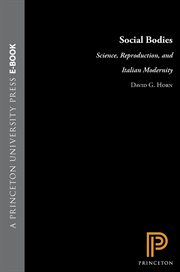Nonfiction
eBook
Details
PUBLISHED
Made available through hoopla
DESCRIPTION
1 online resource
ISBN/ISSN
LANGUAGE
NOTES
David G. Horn is Assistant Professor of Comparative Studies at Ohio State University. Using as his example post-World War I Italy and the government's interest in the size, growth rate, and "vitality" of its national population, David Horn suggests a genealogy for our present understanding of procreation as a site for technological intervention and political contestation. Social Bodies looks at how population and reproductive bodies came to be the objects of new sciences, technologies, and government policies during this period. It examines the linked scientific constructions of Italian society as a body threatened by the "disease" of infertility, and of women and men as social bodies--located neither in nature nor in the private sphere, but in that modern domain of knowledge and intervention carved out by statistics, sociology, social hygiene, and social work. Situated at the intersection of anthropology, cultural studies, and feminist studies of science, the book explores the interrelated factors that produced the practices of reason we call social science and social planning. David Horn draws on many sources to analyze the discourses and practices of "social experts," the resistance these encountered, and the often unintended effects of the new objectification of bodies and populations. He shows how science, while affirming that maternity was part of woman's "nature," also worked to remove reproduction from the domain of the natural, making it an object of technological intervention. This reconstitution of bodies through the sciences and technologies of the social, Horn argues, continues to have material consequences for women and men throughout the West. "This book might properly be called a study in the history of science, in the development of modernist discourse, in the relationship between public and private, in Fascist public policy, in the politics of reproduction, in the sociology of knowledge, or in any of a half-dozen other cutting-edge topics. It is, indeed, all of those, and a solid piece of scholarship to boot." "This book is at once a study of the emergence of reproduction and welfare as the subjects of the new social sciences and government social engineering in interwar Italy and, at the same time, a history of the constitution of the 'social' as an object of study and intervention. A significant contribution to feminist and cultural studies."-Sylvia Yanagisako, Stanford University
Mode of access: World Wide Web







